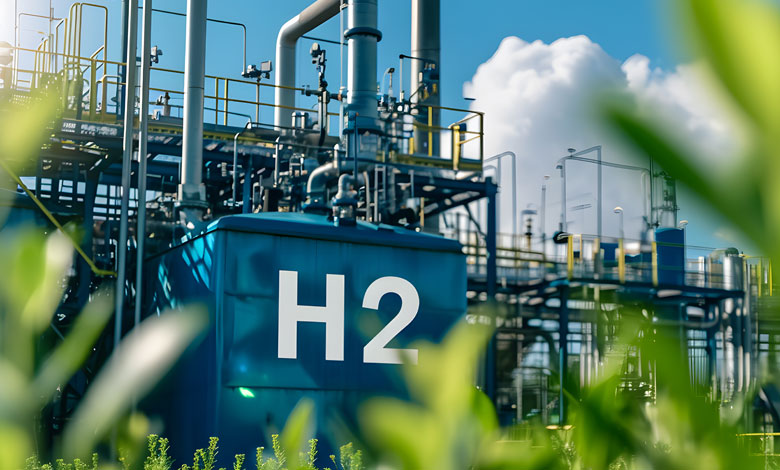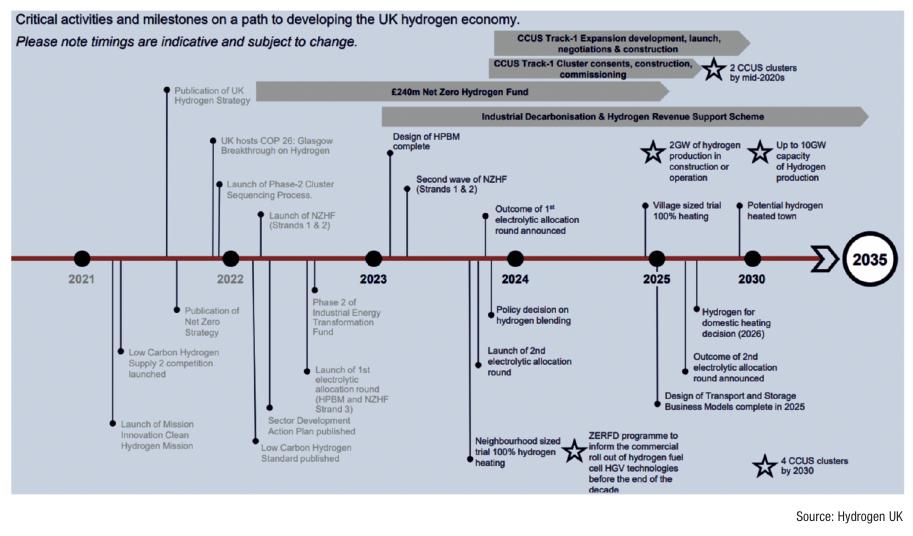Hydrogen: The future of net zero and the role of the UK

Chief Executive of Hydrogen UK Clare Jackson believes a rapid scale of production is essential to accelerate the UK’s efforts in developing the green hydrogen industry.
With renewable i.e. ‘green’ hydrogen emerging as a key player in the journey of net zero regarding the world shifting towards cleaner energy resources, it is significantly important for Northern Ireland and the rest of the UK to pick up momentum in this regard.
Green hydrogen is produced via the electrolysis of water, which splits a water molecule H2O into hydrogen with oxygen as the byproduct. For the hydrogen to be classified as ‘green’, the electrolysis process which powers the heating of the water must be powered by a renewable source.
With around 160 projects within the UK Hydrogen Project Directory in the UK project pipeline, and seven of those projects currently in Northern Ireland, Jackson highlights the importance of renewable hydrogen in the energy transition, the UK’s potential as a global leader, and the challenges that lie ahead.
Acknowledging the energy system is becoming increasingly complex and integrated, Jackson emphasises the need for collaboration across various sectors to achieve net zero. “It is important that all of the elements within the energy transition, that we are talking to each other, collaborating with each other, and we are doing it in a joined-up manner,” she explains.
Regarding the role of renewable hydrogen within the energy landscape, Jackson recognises the challenges that the UK will face in relation to emerging as one of the global leaders in the green hydrogen space stating: “It is not just the UK that has recognised the opportunity that hydrogen presents and there is a lot of excitement globally around hydrogen. It is pretty much impossible to look at any national net zero strategy without seeing hydrogen as a real key part of that.”
Global interest and UK developments
Regarding the role of hydrogen within the energy landscape, Jackson explicates that the US Inflation Reduction Act, with its generous tax credit for hydrogen production, has ignited a wave of investment and competition.
Jackson acknowledges the challenges that the UK will face in relation to emerging as one of the global leaders in the green hydrogen space, stating: “We have found in some areas such an offshore wind, we are the global leader in deployment – second only behind China – but when it comes to realising the economic value of the jobs associated with that, a lot of the high-tech resources are actually developed and manufactured elsewhere and we have not managed to capture that, not just in the deployment but also in manufacture.”
Despite the intense global competition, Jackson believes the UK is well-positioned to capitalise on the hydrogen opportunity, due to the UK’s early adoption of hydrogen technologies and mature project pipeline.
“It is absolutely imperative we are taking stakeholders and taking consumers along with us on this journey.”
Clare Jackson, Chief Executive of Hydrogen UK
In light of this, Jackson highlights that the UK must act quickly to maintain its lead. “It is estimated that by 2050, hydrogen will be a $2.5 trillion global market and we want to make sure that we are identifying parts of the value chain so the UK can be a global leader,” she says.
The future energy system
Jackson outlines the key roles that hydrogen will play in the future energy system. First, hydrogen can provide long-duration energy storage to ensure grid stability. “We are moving from a system which is very dispatchable, where we can turn the energy on and off when we want to a system, to energy production that goes on and off with the weather,” she explains. In reflection of this, Jackson says that unlike many other renewable energies, regarding long-term solutions, hydrogen can be stored when renewable energy is abundant and used when it is not, ensuring a stable energy supply.
Additionally, hydrogen is ideal for applications that are challenging to electrification, such as heavy industry and large transport sectors.
“Anything where you need high-grade heat similarly are larger transport things like aviation, maritime, things where it is very challenging to put a heavy battery in and the high energy density of hydrogen gives it a real advantage in that area,” she states.
Challenges and recommendations
Jackson addresses several challenges the UK must overcome to become a leader in the hydrogen industry. Rapidly scaling production, stimulating demand, and developing infrastructure and storage are among the most pressing challenges. Jackson points out that the UK has a 10GW production target for 2030 but currently has minimal hydrogen production. “We need to rapidly scale production,” she asserts.
Regarding infrastructure, the UK Government has committed to bring the hydrogen transport models forward by 2025, agreed to cluster sequencing programmes and further agreed to some blending into the GDNs. Jackson believes that the target for transport models is too late, due to long lead times. “We need the Government to show a little bit more flexibility to try and get some investment moving forward,” she states.
Furthermore, to deliver net zero, Jackson states the UK will need approximately 30-80GW of hydrogen production by 2050. With this figure equating to roughly size of UK electricity domain today, this large figure further emphasises the need for the UK to act at pace.
Another critical challenge is developing the skilled workforce required to support the hydrogen industry. Jackson cautions against complacency and emphasises the need to bring stakeholders and consumers along on this journey. “It is absolutely imperative we are taking stakeholders and taking consumers along with us on this journey,” she concludes.







